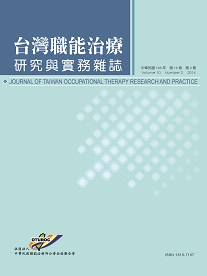Journal of Taiwan Occupational Therapy Research and Practice

半年刊,正常發行
目的:精神障礙者復健的最終目標之一是重回職場並適應社會生活。本文應用系統性文獻回顧方式,探討2002至2007年學者所發表的文獻中,支持精神障礙者重返工作之因素,以增進專業人員協助精神障礙者重返工作之認識與應用。方法:本研究使用系統性回顧的方式,於Medline, CINAHL及PsycInfo三個資料庫中以(1)預測因子,(2)職業,(3)精神疾患之關鍵字兩兩組合搜尋2002-2007年之全文期刊文獻。共搜尋到19篇文獻,經篩選後,共有11個研究(13篇文獻)納入本文獻回顧。結果:本文將影響精障者重返工作之因素歸類為四個面向:醫療、心理社會、環境支持及功能面向。結果顯示,『是否接受支持性就業服務』及『社交技巧/社交接觸』在實證型研究中最頻繁被提到;非實證型研究由於回顧之篇數不足,無法得出較有力之結論。在文獻回顧中,以支持性就業為最頻繁被應用之工作復健服務種類。結論:本研究結果顯示,影響個案重返工作之因素中,最頻繁被各研究提到的因素為個案是否接受支持性就業及其相關服務;其他因素如社交技巧/社交接觸在臨床促進個案重返工作上亦值得重視。
Although large-scale surveys indicate that most patients with psychiatry disorder wish to return to work, unemployment remains a major consequence of schizophrenia and other severe mental illnesses. This paper reviews empirical studies published between 2002 and 2007 to identify variables related to employment outcome of psychiatry patients. Methods: Literature was identified through systematic searches in three databases (Medline, CINAHL, and PsycInfo). We applied combinations of three groups of key words to perform the search. They include: (1) outcome or predictor, (2) employment or work or job, (3) psychiatry or mental illness or mental disorder. Nineteen articles were located and 6 were excluded because of their review nature. Three of these papers were from the same study and were combined into one. Finally, 11 studies were used for current review. Results: Four categories were used to classify the predictors of employment: medical, psychosocial, environmental and functional variables. The more important factors were whether clients receive supported employment programs and their social skills/social contact. Conclusion: The current review identified 11 empirical studies for analysis. Our major finding is that the type of work rehabilitation program received by the patients played a major role in successful employment outcome, especially for supported employment. Other variables such as social skills/social contact need clinical attention to improve employment outcome.












